
Dying and the Medicine of Healing Relationships
Jul 07, 2017Can we heal the dying?
How to heal the dying was a question that weaved through many sessions at the recent BC Hospice and Palliative Care Association (BCHPCA) Conference that Michelle and I attended.
The conference shined a light on the incredible work that so many people do as their vocation, as volunteers, and as family caregivers. Elder Shane Point, a respected Musqueam community member, ceremonial traditional speaker and cultural educator, set the tone in his opening welcome by acknowledging that human beings are all medicine for each other. While that is the end point and meta truth of the matter, he went on to say that people active in this field, extend their love and compassion beyond their everyday intimate circles to touch and be touched by the very personal experience of dying.
Extending the Circle of Compassion
The theme of the conference was “Extending the Circle of Compassion” and one of the many highlights was the keynote address by Michelle O’Rourke, Registered Nurse, Author and Program Coordinator for the Chatham-Kent Hospice and the Oncology and Palliative Care Programs, Chatham-Kent Health Alliance, Ontario. She conveyed the importance of being a “care partner” rather than a “caregiver” and encouraged us to meet others in their pain before journeying together towards their healing and wholeness.
Her presentation included a pair-sharing exercise. I shared with a partner about when my father was dying from prostate cancer. In the last few months of his life, he didn’t talk much. I remember one afternoon sitting at his bedside and just holding his hand in silence for three hours. I tried to let go a few times, thinking he must be sleeping, but he held tightly each time and I was happy to stay. Those silent, undistracted hours together were probably the most focussed, present time we ever shared.
We don’t always need special skills to be a healer. We just need to “be” with each other.
My relationship with my father was not always easy. I grew up feeling undervalued by this man I adored. Over the years he reminded me both outrightly and subtly that he wished he had more sons. As a result, I decided at an early age that I would not love him. When I sat with my vulnerable dad that afternoon, I softened into the act of fully letting go and being the love I always wanted to get and always wanted to give. I’ll never know what impact those three hours had on him, but almost fifteen years later, I hold onto that memory as a beacon of what true love feels like.
Healing is being the love you want to get and the love you want to give.
Just like Michelle Pante wrote in To Serve and Be Served, healing and transformation are available to all parties. Michelle O’Rourke reminded us that the word “care” means to lament, grieve, and experience sorrow with someone else’s pain. She noted that caring is a partnership where one person brings their pain, brokenness and vulnerability to another. Through a relationship of trust we work together towards healing and wholeness.
I loved the quote she shared by Massachusetts-based, Saki Santorelli, Professor of Medicine, Director of the Stress Reduction Clinic, and Executive Director of the Centre for Mindfulness, Health Care and Society, reminding us that, “For too long care has been conceived of as either practitioner-centered or patient-centered. In actuality, the healing relationship has always been a crucible for mutual transformation.”
Healing happens when we treat dying as a natural process and a personal experience.
Michelle O’Rourke also reminded us that dying in our culture is usually seen as a failure rather than a natural process. In reality, however, it’s fundamentally a personal experience—as it was with my dad and I—rather than a set of medical issues to be solved.
What about you?
How have you helped heal the dying, and yourself in the process?



